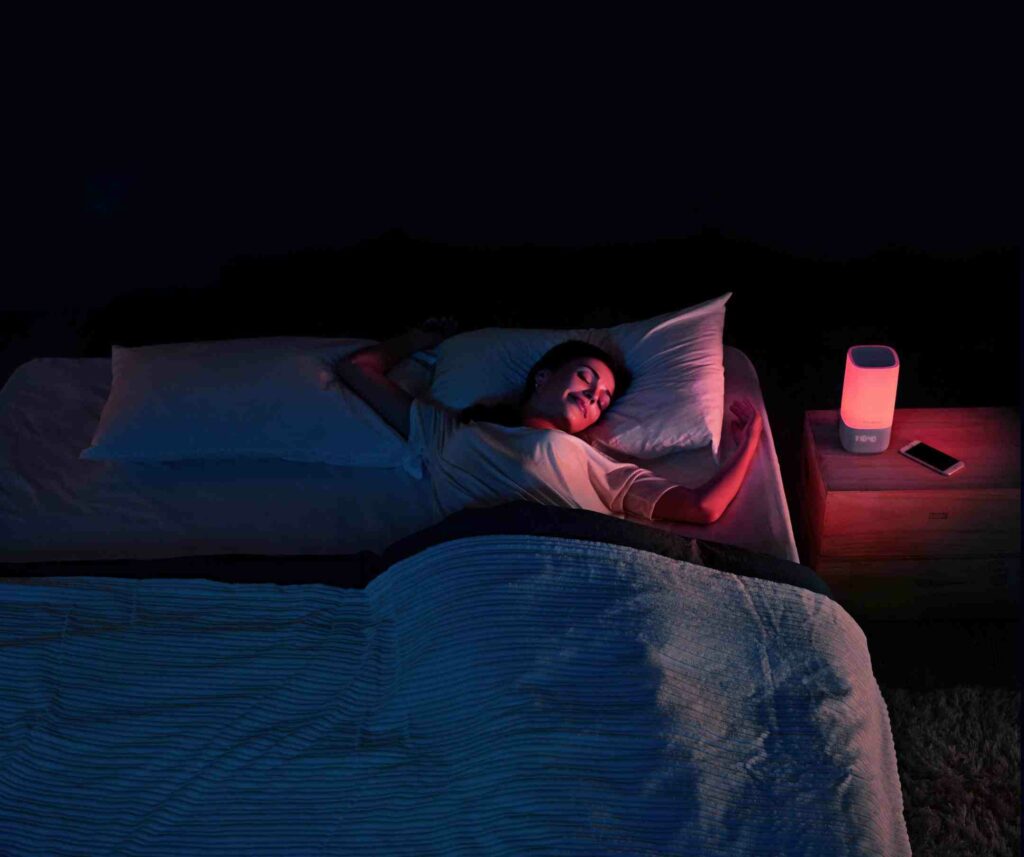Do you find yourself tossing and turning at night, unable to get a good night’s sleep? If so, you may be struggling with sleep anxiety. This condition can be very frustrating and can lead to a number of negative consequences. In this blog post, we will discuss what sleep anxiety is, the symptoms associated with it, and how to deal with it!
Contents
What Is Sleep Anxiety?
 Sleep anxiety is described as a feeling of unease, worry, or fear that prevents you from falling asleep or staying asleep. Sleep anxiety can manifest itself in different ways. Some people may experience racing thoughts that make it difficult to fall asleep. Others may have trouble waking up in the morning.
Sleep anxiety is described as a feeling of unease, worry, or fear that prevents you from falling asleep or staying asleep. Sleep anxiety can manifest itself in different ways. Some people may experience racing thoughts that make it difficult to fall asleep. Others may have trouble waking up in the morning.
This anxiety is defined as fear or worry about not being able to sleep or feeling rested after sleep. People with this anxiety may also have difficulty concentrating during the day. Even so, some people have a distinct fear of not being able to fall asleep or a phobia of not being able to sleep.
It is also believed that people with sleep anxiety may have a higher risk of developing depression. In fact, sleep and psychotic disorders share many risk factors. And they are often comorbid, meaning they occur together.
Sleep Anxiety And Comorbidity
Comorbidity is defined as the presence of one or more disorders in addition to a primary disorder. This condition and type of anxiety are often comorbid with other conditions such as:
- Insomnia: This is defined as difficulty falling asleep or staying asleep. People with insomnia often have difficulty functioning during the day due to fatigue.
- Restless Leg Syndrome: This disorder is characterized by an irresistible urge to move the legs. It is often associated with a crawling, tingling, or burning sensation in the legs.
- Periodic Limb Movement Disorder: This disorder is characterized by repetitive movements of the legs during sleep. It can often lead to insomnia due to the disruption of sleep.
- Sleep Apnea: This disorder is characterized by pauses in breathing during sleep. It can often lead to daytime fatigue due to the lack of oxygen reaching the brain.
- Narcolepsy: It is characterized by excessive daytime sleepiness. It can often lead to insomnia due to the difficulty in staying awake during the day.
These are some examples of conditions that are often comorbid with sleep anxiety. If you have any of these conditions, it is important to seek treatment from a qualified professional. Moreover, there are some other disorders that cause you to have this anxiety. These include:
- Anxiety Disorders
- Depression
- Bipolar Disorder
- PTSD
- OCD
- Schizophrenia
These are just a few examples of disorders that can cause sleep anxiety. So, it is important to seek professional help if you think you may have any of these disorders.
What Are The Symptoms Of Sleep Anxiety?
 There are a number of symptoms that come along with this condition. Some of the emotional symptoms are:
There are a number of symptoms that come along with this condition. Some of the emotional symptoms are:
- Feeling overwhelmed
- Difficulty concentrating
- Irritability
- Restlessness
- Excessive worry
Some physical symptoms are:
- Racing heart
- Sweating
- Shortness of breath
- Headaches
- Stomach problems
These symptoms can make it very hard to fall asleep or stay asleep. If you’re experiencing any of these symptoms, you may be dealing with sleep anxiety. Moreover, sleep anxiety can also lead to insomnia.
According to studies, some people may also experience sleep paralysis. Sleep paralysis is when you’re unable to move your body or speak when you wake up. This can be a very scary experience, but it’s usually not harmful. It usually only lasts for a few minutes. So, it is a serious and real problem that can have many negative consequences.
What Causes Sleep Anxiety?
When you have anxiety, your body is in a constant state of fight-or-flight. This means that your body is always on high alert, which can make it difficult to relax and fall asleep. There are many different things that can trigger sleep anxiety. In fact, stress and anxiety are the main triggers for this condition.
This creates a feeling of fear or unease that can make it difficult to fall asleep or stay asleep. Other things that can trigger sleep anxiety include:
- A change in your sleep schedule
- An uncomfortable sleeping environment
- Noise and distractions
- Excess caffeine
- Certain medications
- Health conditions such as restless leg syndrome or sleep apnea
Moreover, research suggests that anxiety affects rapid eye movement (REM). This is the stage of sleep when you dream. Dreams often reflect your thoughts and worries. So, if you have anxiety, you may have difficulty sleeping and may also have nightmares.
Therefore, anxiety affects sleep and in a similar way, sleep affects anxiety. This means that if you have anxiety and difficulty sleeping, it can create a vicious cycle. The good news is that there are things you can do to break this cycle and get both anxieties and sleep under control.
How It Is Diagnosed?
 The diagnosis of sleep anxiety usually starts with a consultation with a sleep specialist. During the consultation, the specialist will ask about your symptoms and medical history. They may question you things like:
The diagnosis of sleep anxiety usually starts with a consultation with a sleep specialist. During the consultation, the specialist will ask about your symptoms and medical history. They may question you things like:
- How long does it take you to fall asleep?
- Do you have difficulty staying asleep?
- How often do you wake up during the night?
- What is your sleep schedule like?
The specialist may also ask about any medications you’re taking, any medical conditions you have, and any recent changes in your life. Moreover, the specialist will also likely conduct a physical examination. They may conduct a sleep study test to examine how you sleep. The sleep study is usually done overnight in a sleep lab. The examiner will evaluate certain things such as:
- Blood oxygen level
- Body positioning
- Eye movement
- Muscle activity
- Heart rate
- Sleep stages
So, diagnoses are not simple and require a sleep specialist. Furthermore, it is important to note that sleep anxiety is not a diagnosable condition on its own. It is usually diagnosed as a symptom of another condition, such as insomnia or sleep apnea. If you think you may have sleep anxiety, be sure to consult with your doctor.
What Are The Treatment Options?
 When you have sleep anxiety, you might think that there’s nothing you can do about it. But there are professional treatment options available that can help you get the rest you need.
When you have sleep anxiety, you might think that there’s nothing you can do about it. But there are professional treatment options available that can help you get the rest you need.
Here are some of the most effective treatments for sleep anxiety:
Cognitive-behavioral Therapy
CBT is a type of therapy that helps you identify and change the thoughts and behaviors that are contributing to your sleep anxiety. CBT can be done with a therapist in person or online, and it usually takes place over a series of weeks or months. Moreover, this is considered one of the most effective treatments for sleep anxiety and insomnia.
There are many different types of CBT, but one of the most common is called stimulus control therapy. This type of CBT helps you to associate your bed and bedroom with sleep, instead of anxiety and wakefulness. It works by teaching you to avoid activities in bed that can make sleep anxiety worse, such as watching television or working on the computer.
Medication
There are several types of medication that can be prescribed for sleep anxiety, including sedatives, antidepressants, and anti-anxiety medications. These medications can help you relax and get a good night’s sleep. However, they should only be used short-term, as they can be habit-forming.
Some of the examples of medication that can be used to treat sleep anxiety are:
- Benzodiazepines: These are sedatives that can help you feel relaxed and sleepy. Examples of benzodiazepines include Valium (diazepam), Ativan (lorazepam), and Xanax (alprazolam).
- Antidepressants: These medications can help improve mood and sleep. Some examples of antidepressants that are used to treat sleep anxiety are trazodone, mirtazapine, and fluoxetine.
- Anti-anxiety medications: These medications can help reduce anxiety and promote relaxation. Examples of anti-anxiety medications include buspirone, hydroxyzine, and pregabalin.
If you’re considering taking medication for sleep anxiety, it’s important to talk to your doctor about the risks and benefits. Medication should only be used as a short-term solution, and it’s not appropriate for everyone.
Support groups
 This is one form of anxiety that you can do something about on your own. If you’re struggling with sleep anxiety, know that you’re not alone—and there are resources available to help you get the restful night’s sleep you need and deserve.
This is one form of anxiety that you can do something about on your own. If you’re struggling with sleep anxiety, know that you’re not alone—and there are resources available to help you get the restful night’s sleep you need and deserve.
One helpful step is to join a support group for people with sleep anxiety. These groups provide a space to talk openly about your experiences with others who understand what you’re going through.
In addition to the support and understanding you’ll find in a group, you can also glean valuable tips and tricks for overcoming sleep anxiety from other members. If you don’t feel comfortable discussing your sleep anxiety in a group setting, you can also find online communities dedicated to the topic.
No matter what route you choose, connecting with others who understand what you’re going through can be an invaluable step in your journey. So, overall these are some professional and scientific ways to overcome sleep anxiety that you can use for your benefit.
How To Prevent Sleep Anxiety?
Sleep anxiety can be caused by a variety of things, including stress, caffeine, and alcohol consumption. To prevent sleep anxiety, there are various things you can do:
Get on a sleep schedule
A sleep schedule is very important in preventing sleep anxiety. Go to bed and wake up at the same time every day, even on weekends. This will help regulate your body’s natural sleep rhythm. Moreover, avoid taking naps during the day as this can make it harder to fall asleep at night.
Create a relaxing bedtime routine
A relaxing bedtime routine can help you wind down and prepare for sleep. This may include:
- reading,
- writing in a journal,
- taking a bath, or
- listening to calm music.
Avoid watching television or using your computer or phone in bed as the blue light emitted can make it harder to fall asleep. In fact, try to avoid using screens for at least an hour before bed.
Establish a regular sleep environment
Your bedroom should be cool, dark, and quiet. Invest in blackout curtains or an eye mask to block out light. Use earplugs or white noise to reduce any outside noise. Creating a comfortable and consistent sleep environment will help cue your body that it’s time to sleep.
Exercise regularly
Regular exercise can help you fall asleep more easily and improve the quality of your sleep. However, avoid working out too close to bedtime as this can make it harder to fall asleep. Aim to finish your workout at least three hours before bedtime. In fact, this is true for any activities that may be stimulating, such as working on a project or having an argument. Even so, staying active for at least 30 minutes a day has been shown to improve sleep.
Watch what you eat and drink
Caffeine and alcohol can disrupt sleep, so it’s best to avoid them in the evening. Instead, have a light dinner and try herbal tea before bed. Eating too close to bedtime can also make it harder to fall asleep. So try to have your last meal at least two hours before bed. Also, you should avoid drinking too much water before bed as this can make you have to wake up to use the restroom during the night.
Practice relaxation techniques
 Relaxation techniques are a great way to reduce sleep anxiety. There are various techniques you can try, such as:
Relaxation techniques are a great way to reduce sleep anxiety. There are various techniques you can try, such as:
- breathing exercises,
- progressive muscle relaxation,
- imagery, or
- mindfulness meditation.
So, these are some useful techniques to make you feel relaxed and prevent sleep anxiety. Try one or more of these methods and see which works best for you. With a little effort, you can overcome sleep anxiety and get the restful night’s sleep you deserve.
Therefore, if you are struggling with sleep anxiety, know that you are not alone. Millions of people suffer from this condition. Fortunately, there are things you can do to ease your anxiety and get a good night’s sleep. So, don’t hesitate to try out some of the techniques mentioned above. You may be surprised at how well they work.
Conclusion
To conclude, sleep anxiety is a real and serious problem that can have a major impact on your life. However, it is important to remember that you are not alone in dealing with this issue. There are many resources available to help you overcome it and get the restful night’s sleep that you deserve.
In fact, one of the best things you can do to overcome this condition is to seek professional help. A therapist can help you identify the root cause of your anxiety and develop a plan to address it. So, don’t hesitate to reach out for help. It could be the key to finally getting a good night’s sleep.
For more information, please contact MantraCare. Anxiety is a common mental health condition characterized by persistent feelings of worry, fear, and apprehension. If you have any queries regarding Online Anxiety Counseling experienced therapists at MantraCare can help: Book a trial Anxiety therapy session


